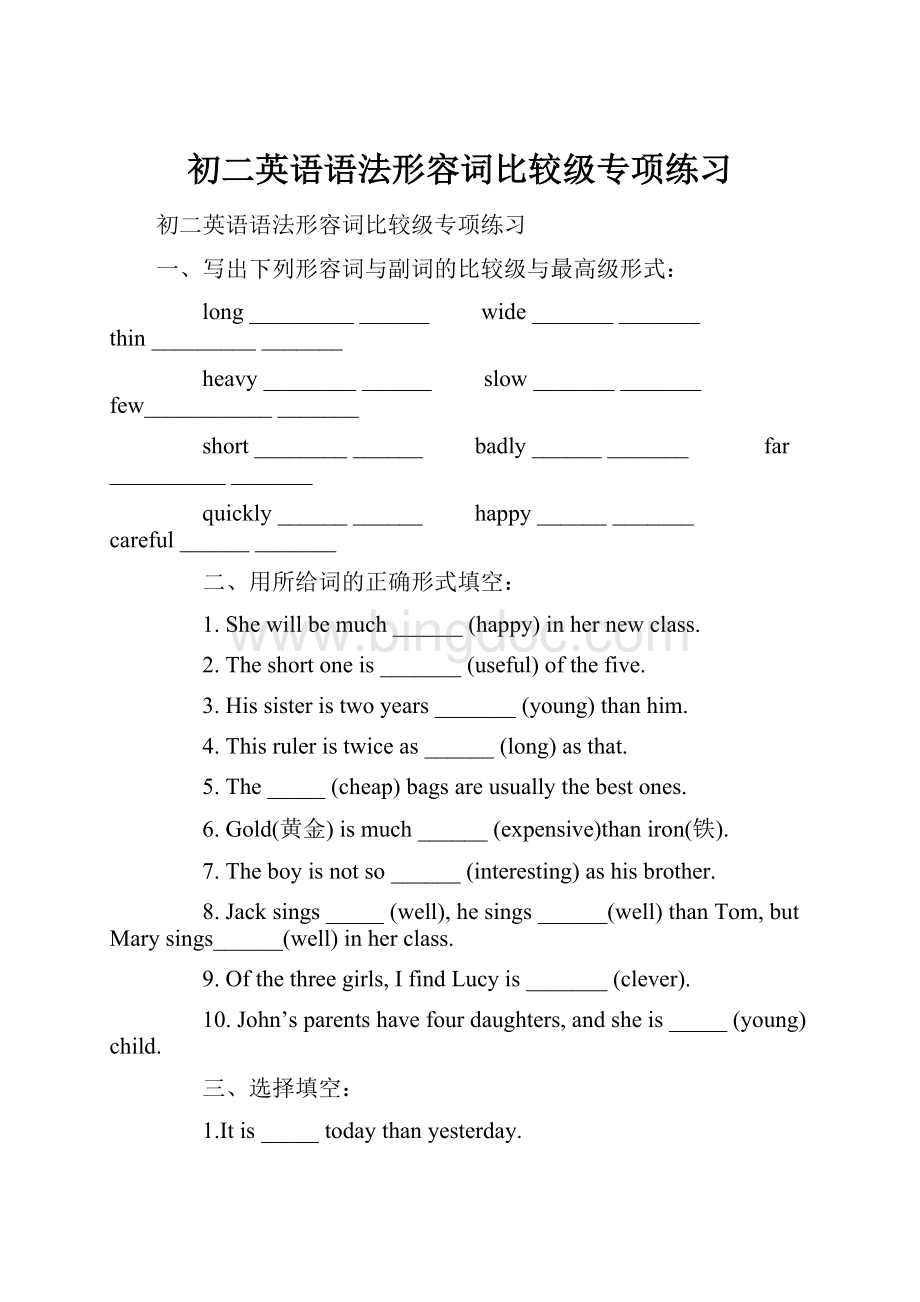初二英语语法形容词比较级专项练习.docx
《初二英语语法形容词比较级专项练习.docx》由会员分享,可在线阅读,更多相关《初二英语语法形容词比较级专项练习.docx(14页珍藏版)》请在冰点文库上搜索。

初二英语语法形容词比较级专项练习
初二英语语法形容词比较级专项练习
一、写出下列形容词与副词的比较级与最高级形式:
long_______________ wide______________ thin________________
heavy______________ slow______________ few__________________
short______________ badly_____________ far_________________
quickly____________ happy_____________ careful_____________
二、用所给词的正确形式填空:
1.Shewillbemuch______(happy)inhernewclass.
2.Theshortoneis_______(useful)ofthefive.
3.Hissisteristwoyears_______(young)thanhim.
4.Thisruleristwiceas______(long)asthat.
5.The_____(cheap)bagsareusuallythebestones.
6.Gold(黄金)ismuch______(expensive)thaniron(铁).
7.Theboyisnotso______(interesting)ashisbrother.
8.Jacksings_____(well),hesings______(well)thanTom,butMarysings______(well)inherclass.
9.Ofthethreegirls,IfindLucyis_______(clever).
10.John’sparentshavefourdaughters,andsheis_____(young)child.
三、选择填空:
1.Itis_____todaythanyesterday.
A.hot B.morehot C.hotter D.muchhot
2.Thislineis____thanthatone.
A.notlonger B.morelonger
C.muchmorelonger D.manymorelonger
3.Ofthefivetoys,thechildchose_____.
A.theexpensiveone B.onemostexpensive
C.aleastexpensive D.themostexpensiveone
4.Whichdoyoulike_____,coffee,teaormilk?
A.thebest B.better C.thebetter D.best
5.Theybettoseewhocouldrun_____inthesportsmeeting.
A.thefastest B.thefaster C.fastest D.faster
6.Thisbookis____ofall.
A.thinner B.thethinner C.morethinner D.thethinnest
7.Shelooks_____thanshereallyis.
A.themoreyounger B.muchyoungerC.veryyounger D.moreyounger
8.Ourcountryisbecoming______.
A.morebeautifulandmore B.morebeautifulandbeautiful
C.moreandmorebeautiful D.morebeautifulandbeautifuler
9.Theearthis_____themoon.
A.49timesasbigas B.49timesasbiggeras
C.as49timesbigas D.asbigas49times
10.Thiskindofdrinkisdifferent______.
A.anditisalsobetter B.andbetterthantheother
C.butalsothanothers D.fromtheother,andbetter
四、翻译句子:
1、他比我大两岁。
Heis_________________thanI.
2、今天比昨天冷得多。
Itis___________today______itwasyesterday.
3、这个故事不如那个有趣。
Thisstoryis_______________asthatone.
4、她的身体一天天好起来。
Heisgetting_________________everyday.
5、他对英语越来越感兴趣。
Heisbecoming_______________________________English.
6、他吃的越多,就越胖。
The______heeats,the_______heis.
参考答案:
一、写出下列形容词与副词的比较级与最高级形式:
longer,longest; wider,widest; thinner,thinnest; heavier,heaviest; slower,slowest; fewer,fewest; shorter,shortest; worse,worst;farther,farthest; morequickly,mostquickly; happier,happiest;morecareful,mostcareful
二、用所给词的正确形式填空:
1.happier 2.themostuseful 3.younger 4.long 5.cheapest6.moreexpensive 7.interesting 8.well,better,best 9.thecleverest 10.theyoungest
三、选择填空:
1.C2.A3.D4.B5.C 6.D7.B8.C9.A10.D
四、翻译句子:
1.twoyearsolder 2.muchcolder,than3.notsointeresting 4.betterandbetter 5.moreandmoreinterestingin 6.more,fatter
一、形容词的一般用法
1.作定语,一般放在所修饰词的前面。
例如,It’sacoldandwindyday.
2.作表语,放在系动词的后面。
例如,Helookshappytoday.
3.形容词修饰something,anything,nothing,everything等复合不定代词时,须放在其后。
例如,Wouldyoulikesomethinghottodrink?
4.表示长、宽、高、深及年龄的形容词,应放在相应的名词之后。
例如,Howlongistheriver?
It’sabouttwohundredmetreslong.
5.只能作表语的形容词:
afraid害怕;alone独自的;asleep睡着的;awake醒着的;alive活着的;well健康的;ill病的;frightened害怕的
例如,Themanisill.(正)
Theillmanismyuncle.(误)
6.只能作定语的形容词:
little小的;only唯一的;wooden木质的;woolen羊毛质的;elder年长的
例如,MyelderbrotherisinBeijing.(正)
Mybrotheriselder.(误)
7.貌似副词的形容词:
lonely独自的;friendly友好的;lively生动的;lovely可爱的
8.复合形容词:
snow-white雪白的English-speaking说英语的;glass-topped玻璃罩的;full-time全日制的;well-known众所周知的;kind-hearted善良的;man-made人造的;take-away可以带走的;ten-year-old十岁的。
二、多个形容词修饰名词时,其顺序为:
限定词(冠词、指示代词、形容词性物主代词、数词)——描绘词(大小,长短,形状,新旧,长幼,颜色)——出处——材料性质——类别——名词
Asmallroundtable一张小圆桌
Atallwhitebuilding一幢高大的白色建筑物
Adirtyoldblackshirt一件又脏又旧的黑色衬衣
AfamousAmericanmedicalschool一个非常著名的美国医学院
三、形容词常用句型
1.“It’s+adj.+of+sb.+不定式”表示“某人(做某事)怎么样”。
注意:
这一句型中常用描述行为者的性格、品质的形容词,如good(好的),kind(友善的),nice(友好的),polite(有礼貌的),clever(聪明的),foolish(愚蠢的),lazy(懒惰的),careful(细心的),careless(粗心的),right(正确的),wrong(错误的)等。
例如,It’sverykindofyoutohelpme.(=Youareverykindtohelpme.)你能帮助我,真好。
It’sveryrudeofhertosaysuchwords.(=Sheisveryrudetosaysuchwords.)她说这样的话,真粗鲁。
It’sfoolishofhimtogoalone.(=Heisfoolishtogoalone.)他单独出去太傻了。
2.“It’s+adj.+for+sb.+不定式”表示“做某事对某人来说怎么样”。
注意:
这一句型中常用的形容词有important(重要的),necessary(必要的),difficult(困难的),easy(容易的),hard(艰难的),dangerous(危险的),safe(安全的),useful(有益的),pleasant(舒适的),interesting(有趣的),impossible(不可能的)等。
例如,It’snoteasyforthemtolearnaforeignlanguage.(=Tolearnaforeignlanguageisnoteasyforthem.)对于他们来说学好一门外语不容易。
It’sveryimportantforstudentstolistentoteacherscarefully.(=Tolistentoteacherscarefullyisveryimportantforstudents.)对于学生来说上课认真听老师讲课是非常重要的。
It’snecessaryforustogettoschoolontime.(=Togettoschoolontimeisnecessaryforus.)对于我们来说按时到校是非常必要的。
3.表示感情或情绪的形容词,如glad(高兴的),pleased(高兴的),sad(忧伤的),thankful(感激的)等常接不定式。
例如,Gladtoseeyou.见到你非常高兴。
I’mverysadtohearthebadnews.听到这个坏新闻,我非常难过。
4.表示能力和意志的形容词,如ready(乐意的,有准备的),able(有能力的),sure(一定),certain(一定)等常接不定式。
例如,LeiFengisalwaysreadytohelpothers.雷锋总是乐于助人。
Heissuretogettoschoolontime.他一定会按时到校。
一、副词的分类
副词按词汇意义可分为:
方式副词:
well,fast,slowly,carefully,quickly
程度副词:
very,much,enough,almost,rather,quite
地点副词:
here,there,out,somewhere,abroad,home,
时间副词:
today,early,soon,now,then,recently,still
频度副词:
always,often,usually,sometimes,seldom,never
否定副词:
no,not,neither,nor,疑问副词:
where,how,why
其他:
also,too,only
二、副词的基本用法:
副词是用来修饰动词、形容词、其他副词以及全句话的词类,表示时间、地点、程度、方式等概念。
例如,1.Weshouldlistentoourteacherscarefully.我们应该认真听老师讲课。
2.Heisveryhappytoday.他今天非常高兴。
3.“Whathappened?
”Iasked,ratherangrily.“发生什么事情了?
”我相当生气地问。
4.Inspring,Icanseeflowerseverywhere.在春天,我到处都能看到花。
三、常见副词用法辨析
1.already与yet的区别
already用于肯定句句中,表示“已经”;yet用于否定句句末,表示“还”,用于疑问句句末,表示“已经”
例如,HehadalreadyleftwhenIcalled.当我给他打电话时,他已经离开了。
Haveyoufoundyourruleryet?
你已经找到你的尺子了吗?
Ihaven’tfinishedmyhomeworkyet.我还没有完成作业。
注意:
already还可以表示惊奇,惊讶等语气,常用于疑问句句末
例如:
Hasyoursongonetoschoolalready?
你的儿子已经上学了吗?
(表示很惊讶)
2very,much和verymuch.的区别
very用于修饰形容词或副词的原级;much用于修饰形容词或副词的比较级;修饰动词要用verymuch.例如,Johnisveryhonest.约翰非常诚实。
Thisgardenismuchbiggerthanthatone.这个花园比那个大的多。
Thankyouverymuch.非常感谢你
3.so与such的区别
⑴so修饰形容词或副词;such修饰名词,
例如,MybrotherrunssofastthatIcan’tfollowhim.我弟弟跑得那么快以至于我跟不上他。
Heissuchaboy.他是一个这样的孩子。
⑵so修饰的形容词后可以有一个单数的可数名词,其结构是“so+形容词+a/an+可数名词单数”.
such可以修饰可数名词单复数和不可数名词,名词前可以有形容词作定语,其结构是“such+a/an+形容词+可数名词单数”,“such+形容词+可数名词复数/不可数名词”,
例如,Heissocleveraboy.=Heissuchacleverboy.他是一个如此聪明的孩子。
Itissuchcoldweather.这么冷的天气。
(正)
Itissocoldweather.(误)
Theyaresuchgoodstudents.他们是那么好的学生。
(正)
Theyaresogoodstudents.(误)
⑶如果可数名词复数前有many,few或不可数名词前有much,little修饰,用so不用such. 例如,somany(如此多的);sofew(如此少的)可以加可数名词复数
somuch(如此多的);solittle(如此少的)可以加不可数名词
4.also,too,aswell与either的区别
also,aswell,too,用于肯定句,also常用于be动词,情态动词,助动词之后,行为动词之前;aswell,too用于句末;either用于否定句中,置于句末。
例如,Myfatherisateacher.Mymotherisalsoateacher.
=Myfatherisateacher.Mymotherisateacheraswell.=Myfatherisateacher.Mymotherisateacher,too.我爸爸是一名老师,我妈妈也是。
Ican’tspeakFrench..Jennycan’tspeakFrench,either.我不会说法语,詹妮也不会。
5.sometime,sometimes,sometime与sometimes的区别
sometime:
某一时间,某一时刻,可指将来时,也可指过去时
sometimes:
有时,不时的sometime:
一段时间 sometimes:
几次,几倍
例如,We’llhaveatestsometimenextmonth.下个月的某一时间,我们要进行一次测试。
Sometimeswearebusyandsometimeswearenot.有时我们很忙,有时不忙。
HestayedinBeijingforsometimelastyear.他去年在北京呆了一段时间。
IhavebeentoBeijingsometimes.我去过北京好几次。
6.ago与before的区别
ago表示以现在为起点的“以前”,常与一般过去时连用,不可以单独使用。
before指过去或将来的某时刻“以前”,也可泛指以前,常和完成时连用,可以单独使用。
例如,Isawhimtenminutesago.我十分钟之前看到的他。
Hetoldmethathehadseenthefilmbefore.他告诉我他以前看过这场电影。
7.now,just与justnow的区别
now:
与一般现在时、现在进行时、现在完成时连用,意为“现在”
just:
与现在完成时、过去完成时连用,表示“刚……”
justnow:
和过去时连用,表示“刚才”
.例如,Wheredoeshelivenow?
他现在住哪里?
Wehavejustseenthefilm.我们刚看过这场电影。
Hewasherejustnow.他刚才在这里。
Ⅲ、形容词,副词的比较级、最高级
一、规则变化
1.一般在词尾直接加er或est,例如,tall-taller-tallest,long-longer-longest
2.以不发音的字母e结尾的单词在词尾直接加r或st,例如,nice-nicer-nicest
3.以辅音字母+y结尾的词,把y变为i,再加er或est,例如,heavy-heavier-heaviest
4.重读闭音节,末尾只有一个辅音字母,双写这个辅音字母,再加er或est,例如,big-bigger-biggest
5.部分双音节词和多音节词分别在原级前加more构成比较级和most构成最高级,例如,slowly-moreslowly-mostslowly;beautiful-morebeautiful-mostbeautiful
Ⅳ形容词,副词 等级的用法一、原级的用法
1.只能修饰原级的词,very,quite,so,too
例如,Heistootiredtowalkon.他太累了以至于不能再继续走了。
MybrotherrunssofastthatIcan‘tfollowhim.我弟弟跑得那么快以至于我跟不上他。
2.原级常用的句型结构
(1)“甲+be+(倍数)+as+形容词原级+as+乙”表示“甲和乙程度相同”或“甲是乙的几倍”
例如,TomisasoldasKate.汤姆和凯特年龄一样大。
TomistwiceasoldasKate.汤姆的年龄是凯特的二倍。
“甲+实意动词+(倍数)+as+副词原级+as+乙”表示“甲和乙程度相同”或“甲是乙的几倍”
例如,TomrunsasfastasMike.汤姆和迈克跑得一样快。
TomrunstwiceasfastasMike.汤姆跑得速度是迈克的二倍。
(2)“甲+be+not+as/so+形容词原级+as+乙”甲不如乙…
例如,Thisroomisnotas/sobigasthatone.这个房间不如那个大。
“甲+助动词+not+动词原形+as/so+副词原级+as+乙”甲不如乙…
例如,Hedoesn’twalkasslowlyasyou.他走路不像你那样慢。
二、比较级的用法
1.可以修饰比较级的词,much,alot,far,…的多alittle,abit,…一点儿
even甚至,still仍然
例如,LessonOneismucheasierthanLessonTwo.第一课比第二课容易得多。
Tomlooksevenyoungerth